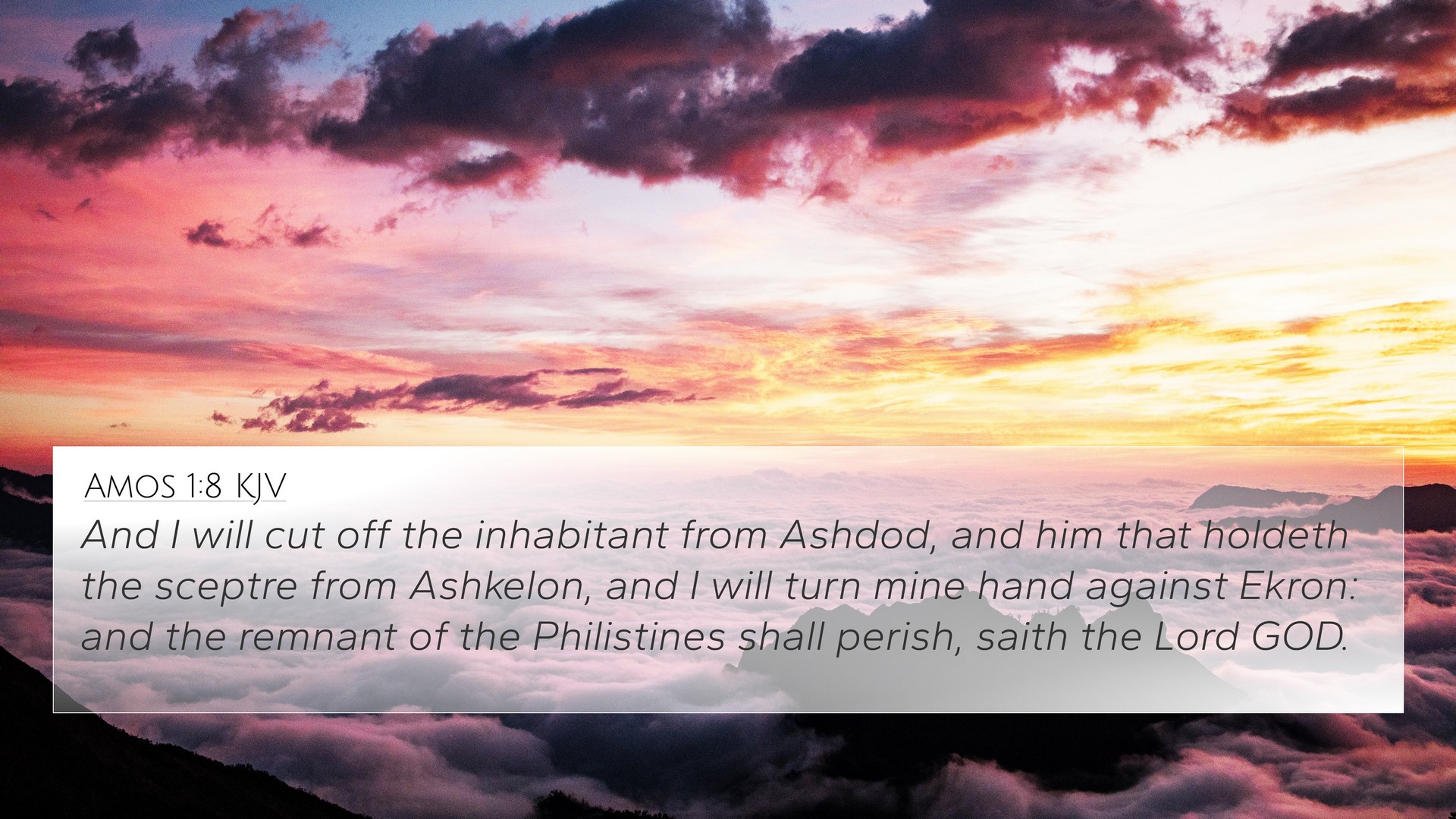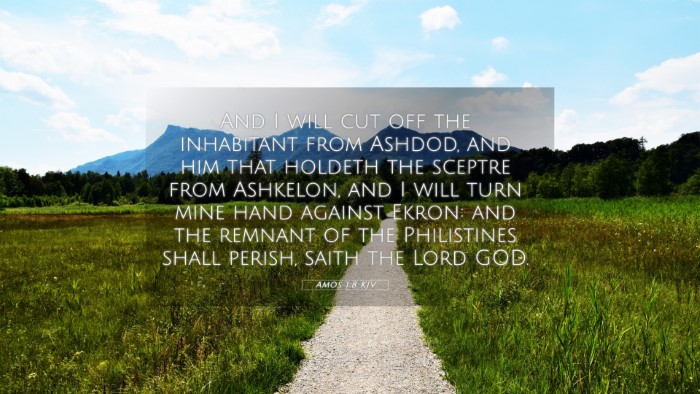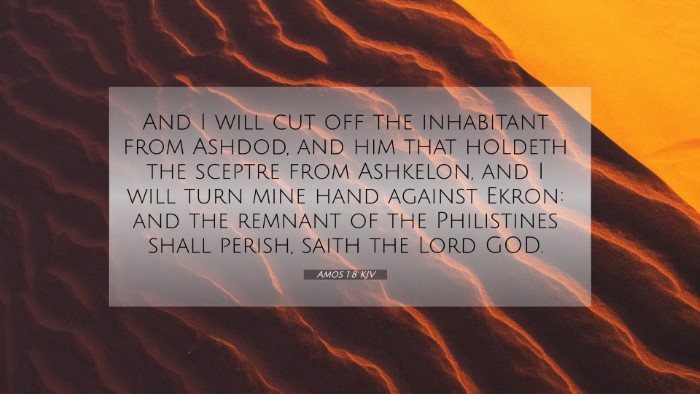Old Testament
Genesis Exodus Leviticus Numbers Deuteronomy Joshua Judges Ruth 1 Samuel 2 Samuel 1 Kings 2 Kings 1 Chronicles 2 Chronicles Ezra Nehemiah Esther Job Psalms Proverbs Ecclesiastes Song of Solomon Isaiah Jeremiah Lamentations Ezekiel Daniel Hosea Joel Amos Obadiah Jonah Micah Nahum Habakkuk Zephaniah Haggai Zechariah MalachiAmos 1:8 Similar Verses
Amos 1:8 Cross References
And I will cut off the inhabitant from Ashdod, and him that holdeth the sceptre from Ashkelon, and I will turn mine hand against Ekron: and the remnant of the Philistines shall perish, saith the Lord GOD.
Uncover the Rich Themes and Topics of This Bible Verse
Listed below are the Bible themes associated with Amos 1:8. We invite you to explore each theme to gain deeper insights into the Scriptures.
Amos 1:8 Cross Reference Verses
This section features a detailed cross-reference designed to enrich your understanding of the Scriptures. Below, you will find carefully selected verses that echo the themes and teachings related to Amos 1:8 KJV. Click on any image to explore detailed analyses of related Bible verses and uncover deeper theological insights.
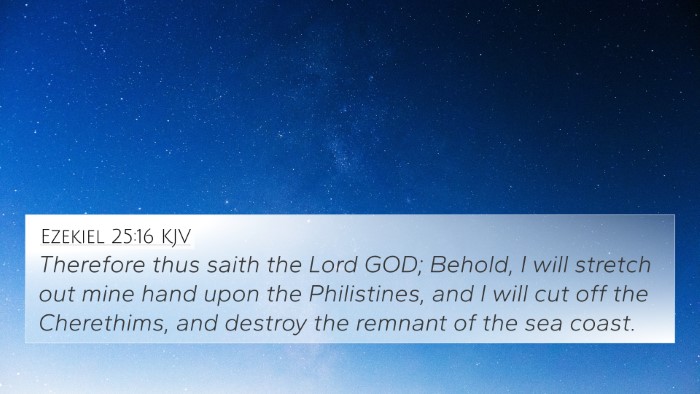
Ezekiel 25:16 (KJV) »
Therefore thus saith the Lord GOD; Behold, I will stretch out mine hand upon the Philistines, and I will cut off the Cherethims, and destroy the remnant of the sea coast.
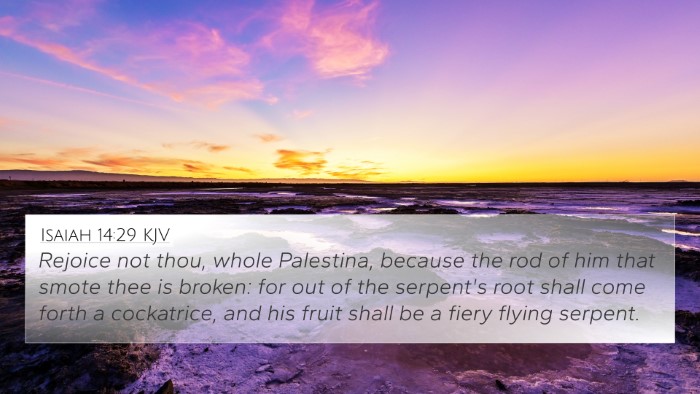
Isaiah 14:29 (KJV) »
Rejoice not thou, whole Palestina, because the rod of him that smote thee is broken: for out of the serpent's root shall come forth a cockatrice, and his fruit shall be a fiery flying serpent.

Jeremiah 47:4 (KJV) »
Because of the day that cometh to spoil all the Philistines, and to cut off from Tyrus and Zidon every helper that remaineth: for the LORD will spoil the Philistines, the remnant of the country of Caphtor.
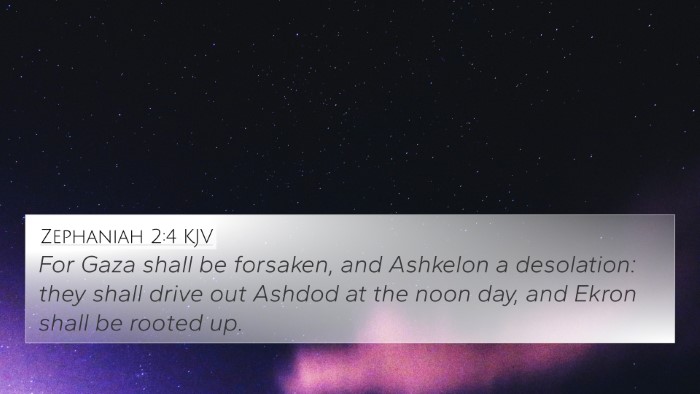
Zephaniah 2:4 (KJV) »
For Gaza shall be forsaken, and Ashkelon a desolation: they shall drive out Ashdod at the noon day, and Ekron shall be rooted up.
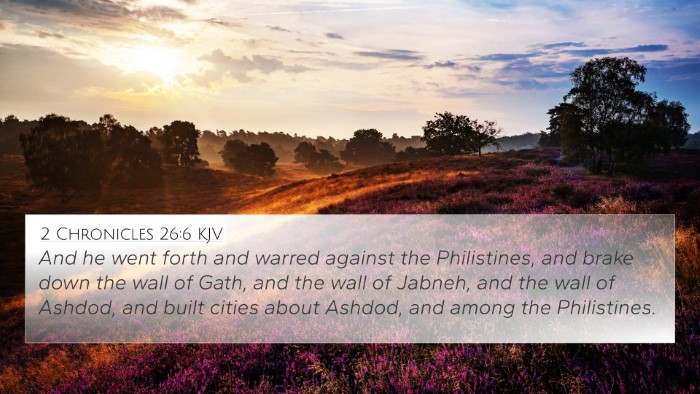
2 Chronicles 26:6 (KJV) »
And he went forth and warred against the Philistines, and brake down the wall of Gath, and the wall of Jabneh, and the wall of Ashdod, and built cities about Ashdod, and among the Philistines.
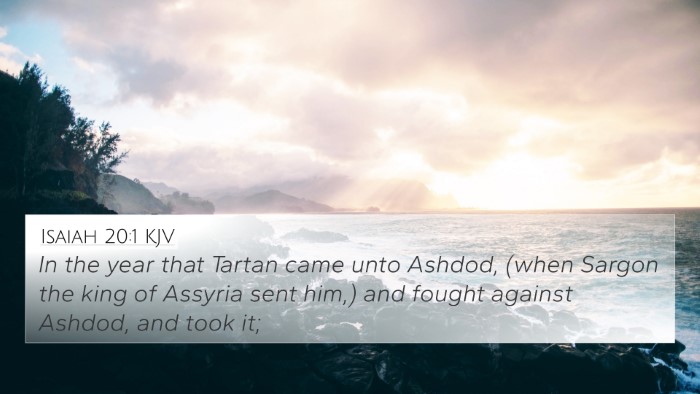
Isaiah 20:1 (KJV) »
In the year that Tartan came unto Ashdod, (when Sargon the king of Assyria sent him,) and fought against Ashdod, and took it;
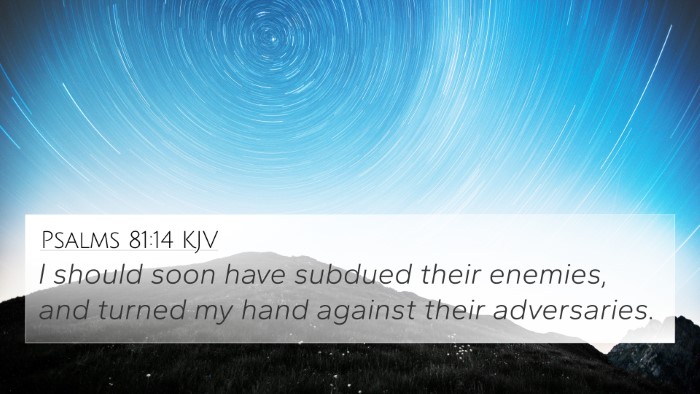
Psalms 81:14 (KJV) »
I should soon have subdued their enemies, and turned my hand against their adversaries.
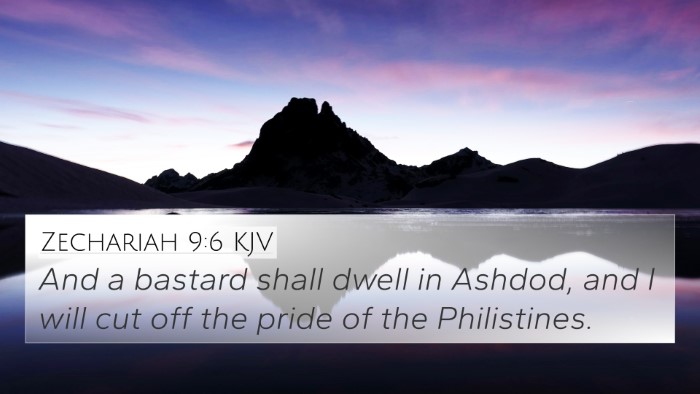
Zechariah 9:6 (KJV) »
And a bastard shall dwell in Ashdod, and I will cut off the pride of the Philistines.
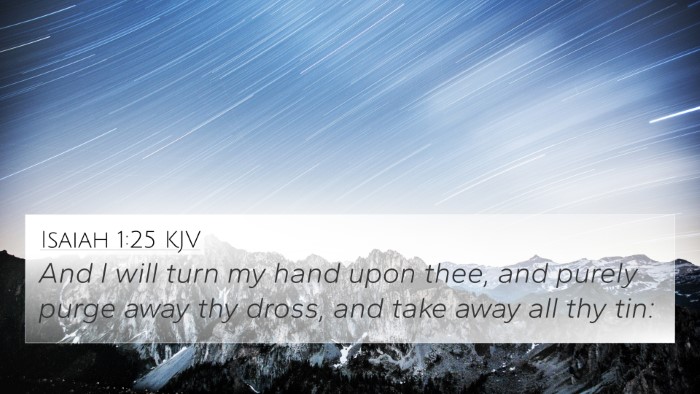
Isaiah 1:25 (KJV) »
And I will turn my hand upon thee, and purely purge away thy dross, and take away all thy tin:
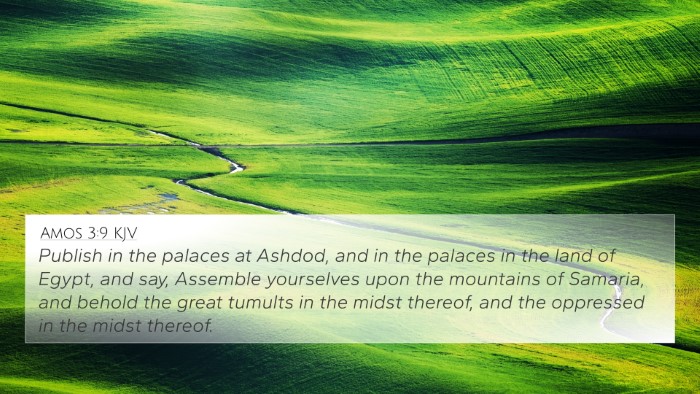
Amos 3:9 (KJV) »
Publish in the palaces at Ashdod, and in the palaces in the land of Egypt, and say, Assemble yourselves upon the mountains of Samaria, and behold the great tumults in the midst thereof, and the oppressed in the midst thereof.
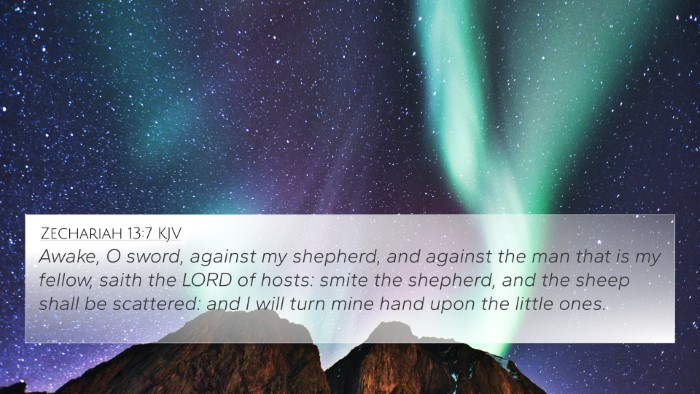
Zechariah 13:7 (KJV) »
Awake, O sword, against my shepherd, and against the man that is my fellow, saith the LORD of hosts: smite the shepherd, and the sheep shall be scattered: and I will turn mine hand upon the little ones.
Amos 1:8 Verse Analysis and Similar Verses
Understanding Amos 1:8
Amos 1:8 reads: "And I will cut off the inhabitant from Ashdod, and him that holdeth the scepter from Ashkelon, and I will turn mine hand against Ekron: and the remnant of the Philistines shall perish, saith the Lord God." This verse highlights God's impending judgment upon the Philistines, revealing His sovereignty and the seriousness of divine retribution.
Exegesis and Implications
Amos, the prophet from Tekoa, delivers a series of judgements against various nations, and here specifically against the Philistines, traditional enemies of Israel. This proclamation of doom reflects God's moral order within the world and emphasizes how nations that stand opposed to His will will eventually face consequences.
Combined Commentary Insights
Matthew Henry's Commentary
Matthew Henry accentuates that this prophecy underscores God's authority over all nations, not just Israel. The destruction of the Philistines, who had allied against Israel, serves as a reminder that God's justice will prevail. Henry points to the symbolic significance of "cutting off" as a representation of total destruction and the end of a societal structure contrary to God’s purposes.
Albert Barnes' Notes
Barnes remarks that the mention of Ashdod, Ashkelon, and Ekron symbolizes the core cities of the Philistines, indicating a total collapse of their power. These cities were significant in Philistine governance and economy, and their fall would represent a critical shift in power dynamics in the region.
Adam Clarke's Analysis
Clarke emphasizes the historical context of the Philistines and their conflicts with Israel. He notes that God's decree was decisive and meant to instill fear and reverence among the nations surrounding Israel. Clarke further stresses that the “remnant of the Philistines shall perish,” signifying a complete purification of the land from malevolent influences.
Thematic Connections
Amos 1:8 serves as a key text for understanding:
- Divine Sovereignty: It shows God controlling the fates of all nations.
- Moral Order: Reflecting the consequences of nations that defy God's commandments.
- Judgment and Mercy: It reinforces the recurring biblical theme of judgment leading to the restoration and the hope of redemption for His people.
Cross-References for Amos 1:8
This verse connects richly with various other scriptures, providing a deeper understanding through cross-referencing:
- Zephaniah 2:4-5: Judgment against the nations surrounding Israel, including the Philistines.
- Jeremiah 47:1-7: A prophecy concerning the Philistines and their impending doom.
- Ezekiel 25:15-17: The Lord's vengeance on the Philistines for their hostility against Israel.
- Isaiah 14:29: A similar forewarning pertaining to the destruction of the Philistine cities.
- Joel 3:4-8: The Lord's judgment on the nations that have afflicted His people.
- Amos 1:6: A neighboring passage concerning God's judgment against Gaza, further contexting the Philistine plight.
- 2 Kings 18:8: An illustration of Israel overcoming the Philistines through divine intervention.
Conclusion
Amos 1:8 is a powerful declaration of God’s judgment that reflects His control over nations and serves as a potent admonition to both ancient and modern readers. It’s vital to navigate these texts with an understanding of inter-Biblical dialogue, as they often reveal parallels in themes of judgment, righteousness, and sovereignty throughout scripture.
